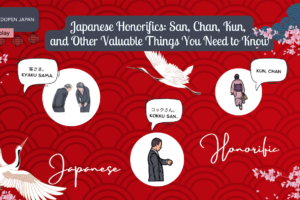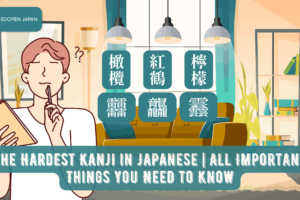For any foreign language learner, knowing and understanding how to say “sorry” is extremely important. Especially for you as a Japanese learner. If you can master how to say sorry in Japanese with such a deep, genuine apology and match moment, you would be able to build great relationships with your Japanese friends.
Here you will learn that there are many different ways to say sorry in Japanese. In everyday Japanese conversation, there are certain moments when we need to be aware and decide to apologise. Whether intentionally or unintentionally, we need to apologise to our partners in order to maintain good social relations.
Not just for you who have started your journey to learn Japanese. The following phrase, which means “I’m sorry” in Japanese, would be very useful for you if you are travelling to Japan and accidentally make a small or even notable mistake.
In particular, the conditions for apologising in Japan are very different from those in your own country. We have summarised the 11 great ways and explained the situations for you to apologise and say sorry in Japanese, so you will never be frozen in the uncomfortable situation that forces you to apologise. Let’s learn the technique of saying sorry in Japanese.
Contents
How do You Apologize in Japanese?
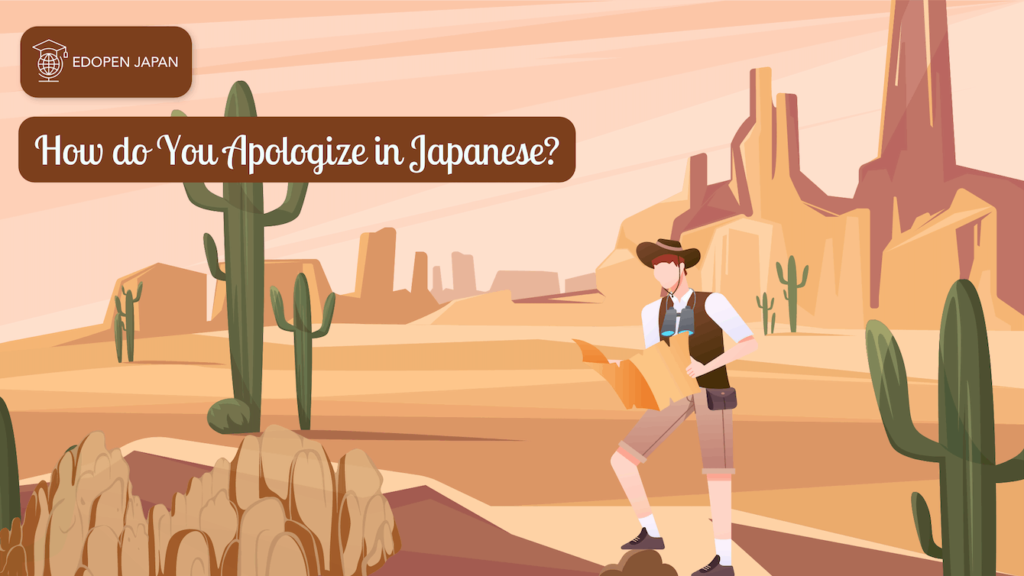
There are several phrases used in everyday Japanese conversation to apologise. One of the most standard or commonly used phrases is ごめん (gomen) or ごめんなさい (gomennasai). ごめん (gomen) is a casual expression, while ごめんなさい (gomennasai) is more formal and respectful.
Apart from this, native Japanese may also add special dialects to this casual phrase to apologise, depending on their region. For example: ごめんね (gomen ne – kantou dialect or standard) or ごめんな (gomen na – kansai dialect).
However, there are at least 10 other phrases that are also commonly used to express apology or regret in various circumstances. You can use them in both formal and informal situations. We hope that you will be able to choose the most appropriate phrase so that your apology is truly heard. Read more in the next section!
If you would like to learn other famous and commonly used Japanese phrases, such as yoroshiku onegaishimasu and others, please read our discussion below:
Read also:
Happy Birthday in Japanese
What’s the Meaning of “Sasuga” (さすが)?
What’s the Meaning of “Naruhodo (なるほど)”?
11 Great Ways to Express Sorry in Japanese
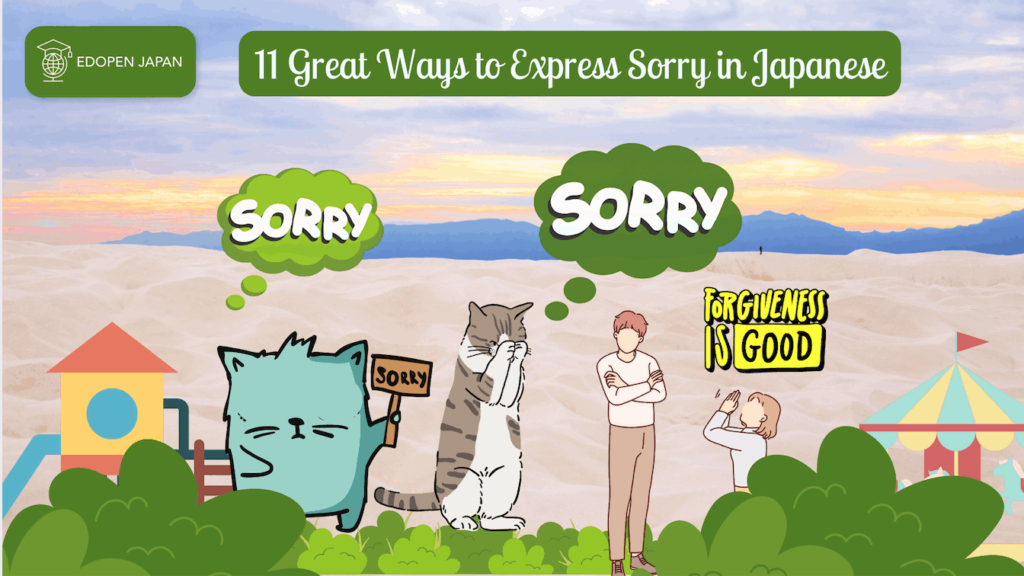
1. Gomen (ごめん)
As you may have heard, the word ‘gomen’ is very familiar and is said many times in anime, so please do not confuse it. Not only do they say ‘gomen’, you will also hear them say ‘gomen ne’ or ‘hontouni gomen’.
Both ‘gomen’ and ‘gomen ne’ are expressions of apology that come from the abbreviation ‘gomennasai’. This gomen or gomen ne expresses a more casual apology. This phrase is only used for or within family, a friend, best friend, close colleague and siblings of the same age.
Although saying this phrase is a very common way of expressing apology in Japanese, it is considered rude to say this phrase to your boss or someone higher in position or age than you. Please do not misuse this phrase!
In English, the literal meaning of this phrase is as follows:
- ごめん: gomen, sorry!
- ごめんね: gomen ne, sorry please!
- 本当にごめん: Hontōni gomen, really sorry!
- 本当にごめんね: Hontōni gomen ne, really sorry please!
2. Gomennasai (ごめんなさい)
Gomen nasai is definitely the most common way of expressing an apology in Japanese and is a very comprehensive term. Compared to gomen or gomen ne as its abbreviation, gomen nasai is more formal.
Generally speaking, if we say this phrase in a situation that calls for a different apologetic phrase, most Japanese speakers will immediately know what we mean and would appreciate it.
However, similarly to the above with the gomen or gomen ne phrase, please bear in mind that although this phrase is very common and easy word, it’s considered rude to use this phrase to apologise to superiors!
Also, this would be a very heartfelt apology, usually used between best friends or between men and women who have a special relationship.
The literal meaning of this phrase is as follows:
- ごめんなさい: gomen nasai, sorry!
- 本当にごめんなさい: hontouni gomennasai, really sorry!
3. Sumimasen (すみません)
As well as gomennasai, this phrase is one of the most common ways of apologising in everyday life in Japan. We can use this phrase as an easy and useful apology when we have unintentionally stepped on someone, for example when we bump into someone on the street, or when we want to call out to the staff in a restaurant or supermarket.
Interestingly, “sumimasen” can also be used to express a feeling of gratitude or thankfulness, similar to arigatou. Why is this? It is because the original kanji (Japanese character) or sumimasen, which is (済みません), has an original meaning in Japanese as “it cannot be settled/completed”, which can be elaborated into the following two expressions:
- I cannot fully express my regret for what has happened and I apologise.
- I cannot thank you enough for going to such lengths for me.
The meaning of this phrase in English is as follows: - すみません: sumimasen, sorry! Or excuse me!
- すみませんでした: sumimasen deshita, I am sorry for what I did in the past (when the word ‘deshita’ is added, it means the word works as a past tense in Japanese).
4. Shitsurei itashimasu (失礼いたします)
The phrase “Shitsurei itashimasu” originally comes from the word “Shitsurei” (失礼), which means rude or literally “losing respect” in Japanese. Therefore, we can assume that this phrase means “I am sorry for my rudeness that might bother you”.
This phrase is used when someone has intentionally or unintentionally broken their promises, for example, not keeping appointments for routine dental checkups, etc.
Then the phrase “Shitsurei itashimasu” is a very polite form of the phrase “Shitsurei shimasu”. It is more polite in the ascending order of politeness in the Japanese language rule. It is highly recommended to use this phrase in such a work or business relationship with your colleague.
In addition, this phrase is also used when we enter someone’s room who might be hanging up the phone. The meaning of this phrase in English is as follows:
- 失礼: shitsurei, sorry for my rudeness.
- 失礼します: shitsurei shimasu, I am sorry for my rudeness (follow ‘shimasu’ here that represents the verb in present form)
- 失礼いたします: shitsurei itashimasu, I would like to say sorry for my rudeness (this is more polite expression following the word itashimasu at the end as the present form verb in Japanese)
- 失礼しました: shitsurei shimashita, I was sorry for my rudeness last time (follow the word ‘shimashita’ that express the verb for the past form in the Japanese)
- 失礼いたしました: shitsurei itashimashita, I profoundly said sorry for my rudeness beforehand (follow the word ‘itashimashita’ to express very polite apology for the past form)
5. Mōshiwake arimasen (申し訳ありません)
This Japanese phrase is a polite and formal apology. Please note that this form of apology is usually used for very big mistakes. Because it is a formal form of polite apology, this phrase is usually used in the business world, not in everyday conversation.
In Japan, for example, this expression is used by a CEO who makes mistakes with the products he produces that have such a big impact on others. It is also often used by employees to refer to their superiors for actions that violate the rules set by the company. The meaning of this phrase is as follows
- 申し訳ありません: mōshiwake arimasen, I am sorry it is very large mistake. This is the formal form for the present situation in Japanese.
- 申し訳ありませんでした: mōshiwake arimasen deshita, similarly as above the meaning is I was sorry for the large mistake I made. Differently, there are ‘deshita’ forms that represent the past form in Japanese.
6. Mōshiwake gozaimasen (申し訳ございません)
Mōshiwake gozaimasen has a similar meaning to mōshiwake arimasen, but is more polite than mōshiwake arimasen. This greeting is usually used by CEO’s or company leaders who make fatal mistakes with such massive consequences, for example.
Mōshiwake gozaimasen is used to apologise to people in a position above us, such as our boss at the office, or to customers, guests and people whose position is higher than ours. This expression shows a great sense of remorse for having made a mistake. The meaning of this phrase in English is as follows;
- 申し訳ございません: mōshiwake gozaimasen, I am sorry it is very large mistake. This is the formal form for the present situation in Japanese.
- 申し訳ございませんでした: Mōshiwake gozaimasen deshita, I was sorry for the large mistake I have done. The phrase uses ‘deshita’ that is the past form in the Japanese.
7. Yurushite kudasai (許してください)
This expression, ‘yurushite kudasai’, is another way to apologise. It means “please forgive me”. So this expression is a form of regret for the mistakes someone has made.
Unlike the other Japanese expressions of apology, this phrase is very direct in asking for an apology. This expression is seen as a form of humility for a person’s mistakes.
Yurushite Kudasai is a form of apology that comes from the word yurushi (許し), which means to forgive. This phrase has many uses and can be broken down as follows;
- 許してね:yurushite ne, please forgive me. This phrase using ‘ne’ at the end only use for someone with the same age with you or with your very close friend.
- 許してほしい:yurushite hoshii, I want you to forgive me. Use this phrase to your love one or someone with very close relation with you.
- 許して下さい:yurushite kudasai, Please forgive me. This phrase is can be used with the nuance more formal.
8. Warui (悪い)
Now that we’ve talked a lot about very polite and formal ways of apologising, let’s try this more casual one. As well as using gomen or gomen ne, here is another way of apologising which is the least formal and can only be used with people who already know you. It is warui or warukatta.
You may have heard this phrase in anime or drama before, in fact the word is sometimes used several times for minor mistakes. In general, warui and warukatta have the meaning of “bad” or can be translated as “oh my bad”. It can also be interpreted as “I’m sorry because I did something bad”.
- 悪い: warui, sorry it is my bad. (present form)
- 悪かった: warukatta, sorry it was my bad (past form)
9. Owabi mōshiagemasu (お詫び申し上げます)
In this article, we will not only discuss how to apologise on casual occasions, but also how to show our respect or apologise in formal or business situations.
In case for business or very formal situations such as in ceremony or press conference of the company, this phrase ‘お詫び申し上げます (owabi moushiagemasu) is very useful to use. This phrase means “I or we sincerely apologise” and shows a very deep politeness.
In addition, we would probably also hear this phrase on a train or in an airport when the vehicle has been stopped or severely delayed due to an accident or bad weather.
In business, this phrase is used at the same time as the phrase 申し訳ございません (moushiwake gozaimasen, which we discussed above) to apologise for any mistakes that affect customers or clients.
Please note and remember this sentence if you are planning to work in a Japanese company in the future, or if you are planning to establish contacts with Japanese companies.
10. Kokoro yori shazai mōshiagemasu (心より謝罪申し上げます)
This phrase has a very intense, formal and profound meaning of apology. 心より謝罪申し上げます (Kokoroyori shazai mōshiagemasu) means “I would like to apologise from the bottom of my heart” or “I would like to apologise from the bottom of my heart”. In this phrase, the word mōshiagemasu is used, which is the very humble form to emphasise the depth and sincerity of the apology.
Although this phrase is rarely used or heard in everyday life. This phrase is usually used in writing by politicians, celebrities or someone with a very high position in the company who needs to apologise as their responsibility for the mistake they have made in front of the public.
11. Gomeiwaku o okake itashimashita (ご迷惑をおかけいたしました)
This phrase is also another super humble, polite way of apologising to someone for helping or supporting you. In practice, this phrase is seen as a way of saying “thank you” rather than an apology.
However, in Japanese culture, it’s more polite and obligatory to apologise when we need help, no matter how small our favour, so using this phrase is very useful to show our thanks and apology in one sentence. By using this phrase, someone who has helped us will feel so much respected and appreciated.
There are 3 common ways of using this phrase in practice, as follows
- ご迷惑をおかけいたしました。(Gomeiwaku o okakeitashimashita that means we apologize for any inconvenience.)
- ご迷惑をして、申し訳ありません。 (Gomeiwaku o shite, mōshiwake arimasen which means we apologize for the inconvenience)
- ご迷惑をおかけしまい、大変申し訳ございません。(Gomeiwaku o okake shimai, taihen mōshiwakegozaimasen that means we are profoundly would like to apologize for the inconvenience – this is super polite!)
We can use this phrase in the office for our boss or superiors when they support us, help our work as our respect and appreciation for their kindness, time and effort given to us.
The Difference Between Sumimasen and Gomennasai?
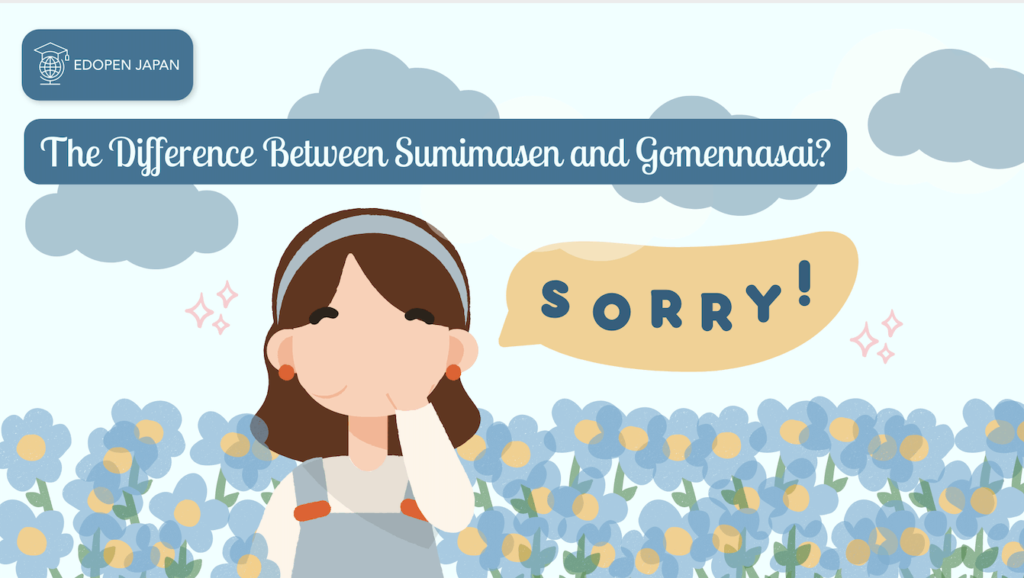
You may be confused about the difference between the phrases すみません (sumimasen) and ごめんなさい (gomennasai). When we want to apologise, these two phrases can actually be used.
But how can we really use them correctly and really understand why native Japanese use the word すみません (sumimasen) in situations where we think it is more appropriate to use ごめんなさい (gomennasai), for example?
The phrase すみません (sumimasen) literally means ‘excuse me’. However, it also has a formal connotation and is often used in a general way. So, for a small mistake or your specific request to someone, use the phrase すみません (sumimasen).
Whereas ごめんなさい (gomennasai) means sorry in Japanese. However, the nuance of the phrase ごめんなさい (gomennasai) is heavier and deeper. So for significant errors, the term ごめんなさい (gomennasai) is more appropriate.
Conclusion
Learning how to say sorry in Japanese is very enjoyable. Finally, we can summarise our discussion on this topic as follows:
- The way to say sorry in Japanese is very diverse with very specific criteria of cases.
- Japanese has specific conditions as well as circumstances and rich phrase options to express their feeling or emotion of regret, understanding exactly how and when to use each expression is very important.
In Japanese culture, the tradition of apologising is used not only for a mistake but also as a form of respect and gratitude for others.


